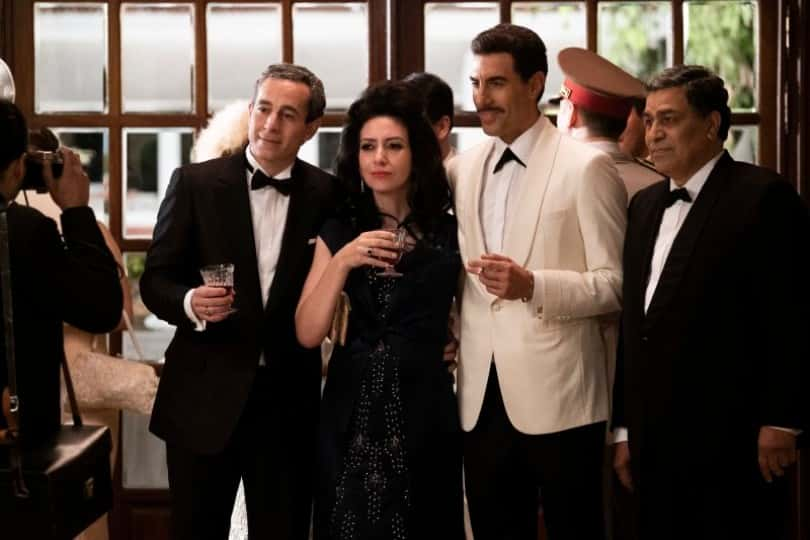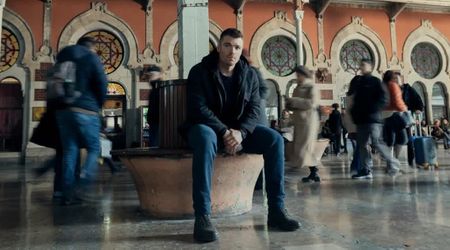'The Spy': The true story of Mossad secret agent Eli Cohen who inspired Netflix's political drama starring Sacha Baron Cohen

Mossad has always had a fearsome reputation for espionage. Among its many spies, Eli Cohen (1924-1965), an Egyptian-born Jew, has achieved legendary status for his exploits as an undercover Mossad agent in Syria in the 1960s. His story will now be told in the six-episode, Netflix miniseries, 'The Spy', premiering on September 6 with Sacha Baron Cohen essaying his role. The series, created by Gideon Raff (the brain behind 'Homeland'), sticks pretty close to the real moments of Cohen's life that saw him separated from his wife Nadia and his children as he took on the cover identity of Kamel, a prosperous Arab businessman. As Kamel, he charmed his way into the inner circle of top-level Syrian officials and leaked crucial intelligence that led to Israel's victory in the 1967 Six-Day War.
Cohen grew up in Egypt in an Orthodox Jewish home. After Gamal Abdel Nasser Hussein's 1951 military coup, Egyptian Jews had targets on their backs and many chose to leave the country to settle in the newly established state of Israel, Europe, the United States, and Canada. Cohen, however, stayed back to finish his degree in electronics. While in Egypt, he got caught up in Zionist activities. Even though he was suspected of working for Israel, he was never caught. However, he was soon kicked out of the country and had to move to Israel where he met Nadia Majald, a Jewish immigrant from Iraq. After they married in Tel Aviv, Cohen, at first, found work as a counterintelligence analyst but found the work boring compared to active espionage work he had been involved in Egypt. Bored, he applied to join Mossad but was rejected. This offended him greatly and he resigned from his analyst job to become a filing clerk at an insurance firm.
This is where 'The Spy' picks up the threads of his story. Cohen was approached by Mossad because they were looking for agents among its Arab Jewish immigrants, who were fluent in Arabic with knowledge about the culture. Cohen with his Middle Eastern features and knowledge of Arabic was a natural fit. After an intensive six-month training course, in which Cohen immersed himself in understanding and learning the Muslim religion and Arabic culture, map reading, and radio broadcasting and cryptography, he was ready. Changing his Arabic accent from Egyptian to Syrian, Cohen became 'Kamel Amin Thaabet'. His cover identity was that of a Syrian born in Beirut. He joined the large, wealthy community of Syrian émigrés in Buenos Aires, Argentina, and posed as a successful businessman with an import/export operation. He soon gained the trust of senior officials working in the Syrian embassy. 'The Spy' focusses in particular on his relationship with Amin al-Hafez, a Syrian military attaché, who would later be part of the Ba’ath coup and become the President of Syria. (His son is Bashar al-Assad, the current president of Syria.)

As the Ba’ath party gained power, so did Cohen’s access to top-level Syrian officials, who saw him as a loyal party member. He developed close relationships with the political and military hierarchy and became the Chief Adviser to the Minister of Defense. As a result, he was part of closed government sessions and was privy to information about the Syrian military that he duly transmitted to his Israeli handlers by tapping out dispatches in Morse code, or smuggling documents to Israel via Europe.
Cohen's photographs of Syria’s southern border proved vital to Israel’s military strategy in the 1967 war. He was behind the planting of trees (supposedly to shelter the soldiers standing guard) in Golan Heights - a strategic outpost. Those trees became markers for Israeli soldiers, telling them where to aim their fire to target the Syrian soldiers. In 1964, Cohen returned to Bat Yam in Israel to tell Nadia that he was going on his last mission and to witness the birth of their third child. In 1965, Syrian authorities raided Cohen’s Damascus home and he was caught red-handed relaying a message. Cohen was brutally tortured and then sentenced to death in a military trial. On May 8, 1965, he was proclaimed guilty and sentenced to death by hanging in the Martyrs Square in Damascus.
Before his death, he was allowed to dictate a letter to a local rabbi, addressed to his wife. The letter read: "I am writing to you these last words, a few minutes before my end, and I would like to beg you to maintain a good relationship forever. I request you, dear Nadia, to pardon me and take care of yourself and our children. You can get remarried in order not to deprive the children of a father. You have the full liberty to do so. I am begging you, my dear Nadia, not to spend your time weeping about something in the past.”
Nadia is still alive and never remarried. Syria refused to return Cohen's body and Nadia continues to petition for the return of her husband's remains. The six episodes of 'The Spy' will air on Netflix on September 6.










